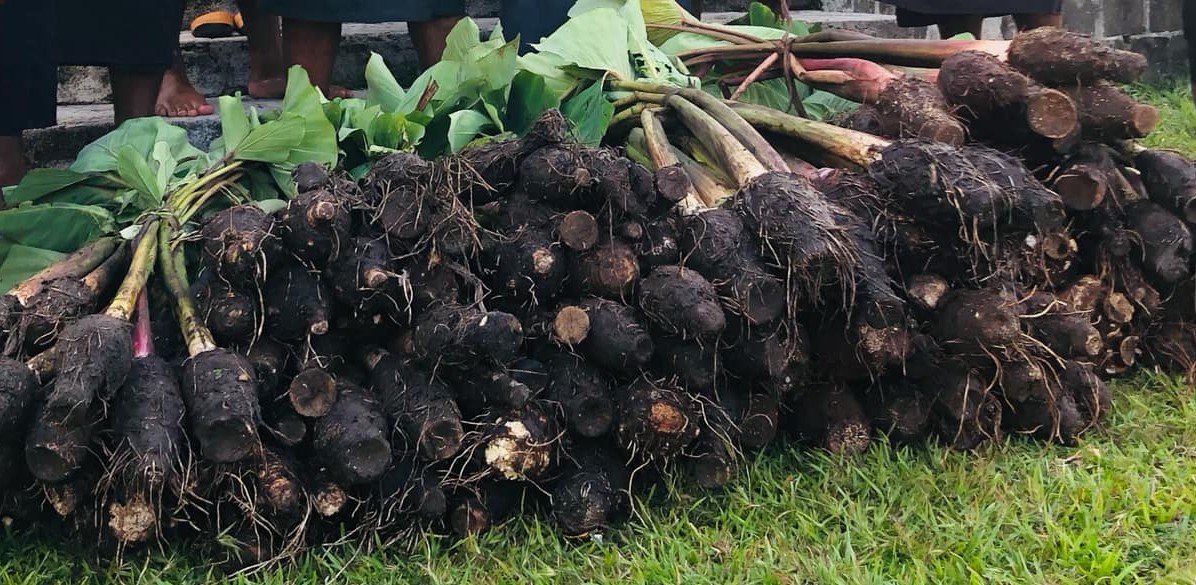FIJI MOVES TOWARDS A NATIONAL ORGANIC CERTIFICATION SYSTEM
November 4, 2025

The Ministry of Agriculture and Waterways has reaffirmed its commitment to advancing organic agriculture in Fiji through the development of a National Organic Policy and Action Plan.
Responding to an oral question in Parliament, the Minister for Agriculture and Waterways, Honourable Tomasi Tunabuna, acknowledged the invaluable contribution of the Pacific Organic and Ethical Trade Community (POETCom) in shaping regional organic standards.
Fiji continues to benefit from POETCom’s Participatory Guarantee System (PGS) — a low-cost, peer-review certification model well-suited to local farmers.
“POETCom, together with regional partners, has invested heavily in two interrelated pillars — the establishment of a regional pool of trained Pacific Islander organic and food-safety auditors and consultants, and the development of low-cost, peer-review models for local certification,” explained Hon. Tunabuna.
“By training auditors who understand our climate, soils, and traditional practices, we can reduce the high costs associated with overseas certification and ensure that our farmers are assessed by people who truly appreciate their work.”
He added that POETCom’s Pacific Organic Guarantee Scheme formally recognises PGS as a credible, locally managed, peer-review mechanism for organic certification.
“It is low-cost, democratic in process, and ideally suited to Fiji’s rural communities. Farmers form groups, conduct joint inspections, and ensure compliance with agreed standards — creating greater ownership, mutual support, and a certification process that works for them,” he said.
Fiji’s Participatory Guarantee System remains an active, community-based approach to organic certification, primarily for local and regional markets. The Ministry supports PGS implementation and is finalising the National Organic Policy and Action Plan to establish an official national framework and potentially formal government recognition of the PGS process.
Hon. Tunabuna also confirmed that Fiji has ratified the Global GAP Standards and is collaborating with PHAMA Plus to develop a tailored Fiji Good Agriculture Practices (GAP) Standard.
“Achieving Fiji GAP certification will be a milestone that empowers farmers to reduce chemical inputs and transition to full organic production if they choose,” he said.
“To give organic agriculture real momentum, a national organic certification should operate at two levels — Semi-Organic (GAP level) and Full Organic — both officially recognised and priced to reward farmers for reducing or eliminating synthetic inputs.”
He emphasised that the
National Organic Policy is being finalised in alignment with the Fiji National
Development Plan (2025–2029), the Non-Sugar Agriculture Sector 10-Year Policy
(2025–2035), and the Strategic Development Plan (2024–2028).
“This is no mere paper exercise. Building on our 2018 draft, the updated policy will mainstream organic agriculture as a pillar of national development — recognising its cross-cutting benefits for public health, environmental resilience, rural livelihoods, and export growth,” said Hon. Tunabuna.
The policy’s development has been inclusive and evidence-based, with the Ministry collaborating with the Market Development Facility (MDF) to convene multi-stakeholder workshops and over twenty consultations with farmers’ associations, certification bodies, technical experts, and civil society representatives.
These consultations produced a SWOT analysis that informed the policy’s vision, goals, and action areas. The Ministry is now in the final validation stage, with the target of submitting the policy to Cabinet before the end of the year.
Under Objective 1, Action Item
1.4, the draft policy outlines initiatives to improve farmers’ access to
organic certification, including:
![]() Certification Awareness:
Providing clear information on certification types — third-party, PGS, and
hybrid models — and their suitability for different operations.
Certification Awareness:
Providing clear information on certification types — third-party, PGS, and
hybrid models — and their suitability for different operations.
![]() Organic Group Certification
Support: Working with PGS group managers, certification bodies, and POETCom to
establish or revitalise certification groups; providing partial subsidies and
training in the Pacific Organic Standard.
Organic Group Certification
Support: Working with PGS group managers, certification bodies, and POETCom to
establish or revitalise certification groups; providing partial subsidies and
training in the Pacific Organic Standard.
![]() Harmonisation and IT
Systems: Streamlining certification processes, developing digital platforms for
group certification, and identifying sustainable technical support mechanisms.
Harmonisation and IT
Systems: Streamlining certification processes, developing digital platforms for
group certification, and identifying sustainable technical support mechanisms.
The policy also draws on POETCom’s Pacific Organic Policy Toolkit to ensure alignment with regional best practices and international standards.
“The Ministry remains committed to close collaboration with POETCom throughout the certification rollout process,” Hon. Tunabuna said.
“But our long-term goal is clear — a Fiji-led organic certification programme that is inclusive, credible, and economically empowering for our producers. Over time, we will transition from reliance on regional structures to a nationally governed system anchored in Fijian expertise and law.”
ENDS
